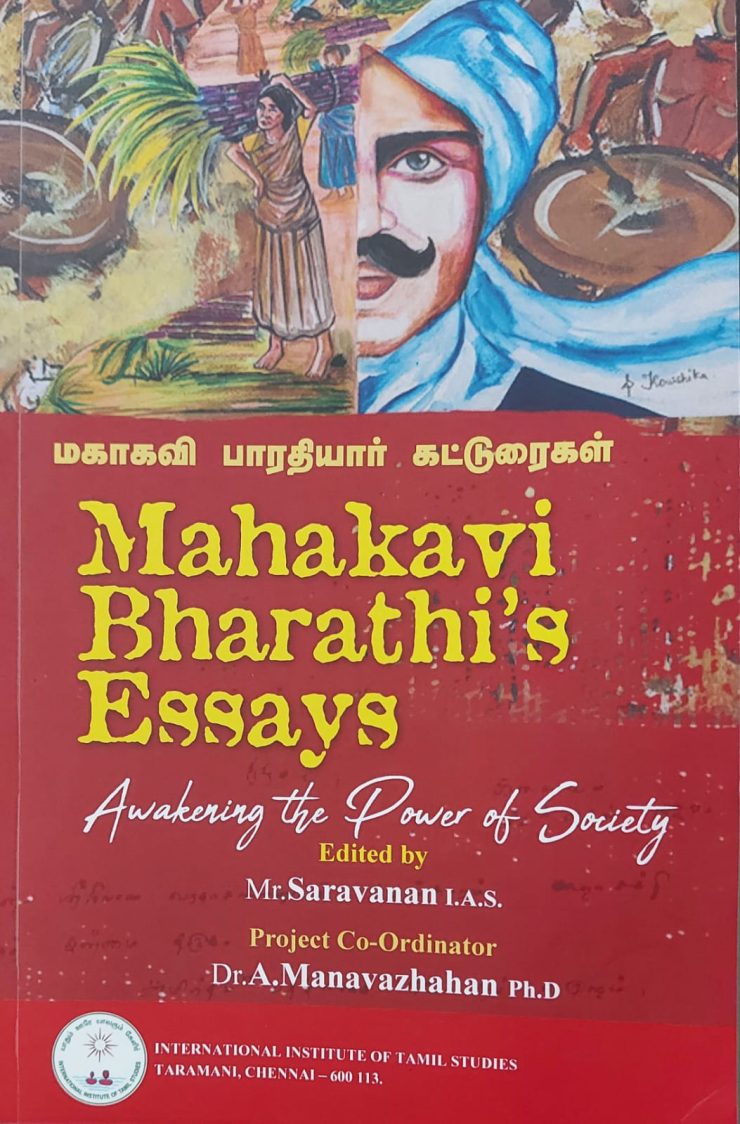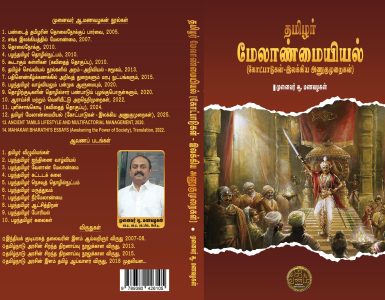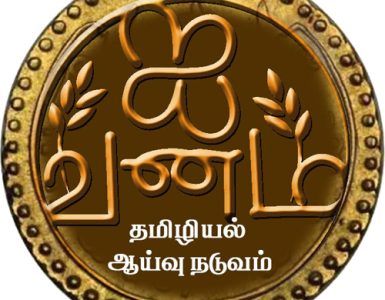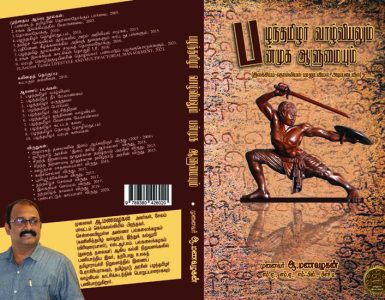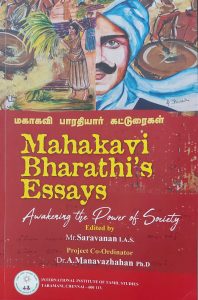
Book : Mahakavi Bharathi’s Essays
(Awakening the Power of Society)
Translators : Dr. A. Manavazhahan
Mrs. S.Malathi
EDITORIAL
Dr. A. Manavazhahan ,
Associate Professor,Sociology, Art & Culture,
International Institute of Tamil Studies, Taramani, Chennai -113.
Bharathiyar lived on this earth only for a short time. But what he has done to benefit the world is too enormous; his writings have endured through the centuries, and Bharathiyar’s thoughts have the power to measure the globe. Bharathi’s innovative art created new techniques in writing while also expressing a sense of humour and passion, all without violating the tradition’s originality. Bharathi contributed modernity to literature as a pioneer of Tamil poetry and prose. Bharathi, who lived up to 39 years old, only inspired the people of India with passionate thoughts and poems. They were more effective weapons that instilled feelings in the people, such as a sense of freedom, nationalism, and self-respect.
Bharathi’s poems are emotionally immersed, while his articles exhibit deep wisdom. Essays are not inferior to poetry, but they provide profound insights and worldly perspectives. However, the fact that Bharathi’s essays could not achieve the heights of his poetry, of is astonishing. Unfortunately, many of the people today’s generation believe Bharathi’s writings are nothing more than poetry. There are several causes behind this. Bharathi’s admirers also appreciated only performing Bharathi’s poems on stage and only including poetry in the school curriculum.
Bharathi stated of the prose, as Kamber informed them in the poem, that it should have all four qualities of clarity, gentility, brightness, and morality. Among these, morality requires that it flow freely and without interruption. There is no proper flow in today’s prose, but there is more wobbling. The hand will write in a linear Tamil manner if there are honesty and courage in the heart and if the Tamil power, a passion for the Tamil language, is anchored in the heart. His works also show that Bharathi was the one who kept Tamil power in mind while maintaining his honesty and courage.
Bharathi’s essays are on the diversity of social development, Indian liberation, national unity, caste equality, religious harmony, passion for the Tamil language, the awareness of Tamil culture, Tamil Nadu’s development, women’s liberation, academic vision, industrial development, and Labour awareness. Bharathi’s texts have crossed the borders of western and eastern countries such as the United Kingdom, the United States, South Africa, Russia, Japan, and China. Bharathi’s societal concepts are still needed today, regardless of language, race, or country. Based on this need, the Government of Tamil Nadu has announced a plan to publish Bharathi’s works in a vintage print. As part of the project, translating Bharathi’s essays into English was done.
The book ‘Bharathiyar Katturaigal (Full)’, published in Tamil by Poompuhar Publications, was used for this English translation project. A few articles from the Sahitya Akademi published under the title ‘Mahakavi Bharathiar katturaigal’ were taken. These articles are not available in Poompuhar publication’s book. The part of the article has been significantly edited from its original Tamil contents to make it easier for readers to understand.
Simplicity and profound thoughts are the beauty of the article, which is Bharathi’s creative principle. However, in the style of his essay, we had to pay extra attention to translating them, as there were a lot of long sentences for a large paragraph size and more usage of the dialects of a particular community. Additional explanations are provided for such dialects to make it easier for readers all over the world to grasp. The ideas expressed by Bharathi in the articles have been translated verbatim, with no changes or omissions.
When referring to the important two duties of Tamil scholars, he says as follows,
“We should seek to promote honey-like
Tamil concepts all across the world.”
“Texts of eminent foreign scholars
Need to be translated in Tamil.”
In these duties, we have not translated the beauty of Tamil into other languages to the extent that they had imported many of the valued intellectuals’ ideas into Tamil. Bharathi, the great Tamil poet, was not as well-known in other languages and among foreigners as Indian poets like Ravindranath Tagore and Western poets like Shelley and Walt Whitman were in Tamil. In light of this, the Hon’ble Chief Minister of Tamil Nadu, Thiru. M.K. Stalin has announced plans to print Bharathi’s texts. He also presented this project to the International Institute of Tamil Studies. I want to express my gratitude to the Chief Minister on behalf of the Tamil scholars.
Thanks to Thiru. Makesan Kasirajan IAS, Secretary to the Government, Department of Tamil Development, who was instrumental in the quick release of the project. Thiru. S. Saravanan IAS, the Director, International Institute of Tamil Studies and Department of Tamil Development, gave me a chance and guidance. He has my gratitude.
Mrs. S. Malathi, a Research Scholar at the International Institute of Tamil Studies, has been helpful in the project’s announcement and completion in a short period. Thanks to her.
CONTENTS
Society
- Don’t give up good nature. 1
- Dowry bail or groom price 4
- Hawk vision 6
- Garland 9
- Body 12
- Wealth – 1 17
- Wealth -2 20
- Old World 34
- Trial 37
- Multifarious things 41
- The way to civilize animals 43
- Reforming Animals 47
- Animals and birds 49
- Why? – Council (Committee) 53
- City 55
- Infinite power 57
- Wolf and pet dog 60
- The Sound of life 63
Profession – Workers
- Future 67
- The relationship between Profession and wealth 70
- A few words for the Labours 73
- The Pride of Labourers 78
Caste – Religion – God
- Value 81
- Meeting of Hindus 84
- Who are the Hindus? 87
- Four Kinds of Race 91
- Paraiyar 94
- Panchamar 96
- Who is a Brahmin? 98
- Hereafter 102
- Whom to worship? 106
- Chidambaram 107
- The word of Jesus Christ 112
- Kamadhenu 116
- Idiotic Devotion 121
Tamil –Tamils –Tamil Nadu
- The status of Tamil 125
- For the Tamils 128
- Science in Tamil language 131
- Awake Tamil Nadu 133
- Civilization of Tamil Nadu 137
- The Language Formed With The Breeze. 145
- Tamil 147
Women’s Dignity and Liberation
- Tamil Nadu women 149
- Brave Mothers 151
- Freedom of Women 154
- For Tamil Nadu Women 159
- Sisters! 163
- The Pathetic State of Widows in India 172
- The Chaste Woman 176
- Marriage Laws in Modern Russia 179
- The State of Muslim Women 183
- Liberation of women in South Africa 188
Education – Arts
53 National Education 190
- Subjects 195
- Village Schools 209
- Matter of Music 213
- Instrumental music 223
- Women’s Songs 227
- Abhinaya 231
- Japanese Poetry 236
